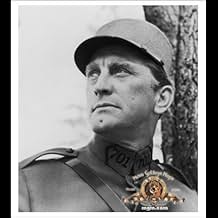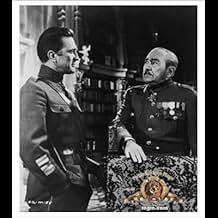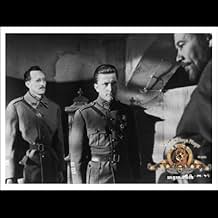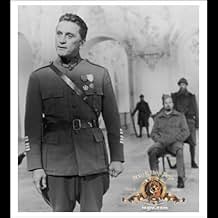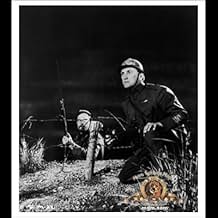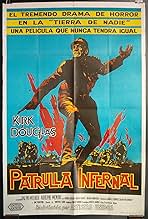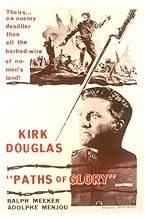A colonel defends three of his soldiers in a court-martial after they abandon a suicidal attack.A colonel defends three of his soldiers in a court-martial after they abandon a suicidal attack.A colonel defends three of his soldiers in a court-martial after they abandon a suicidal attack.
- Nominated for 1 BAFTA Award
- 5 wins & 3 nominations total
- Pvt. Pierre Arnaud
- (as Joseph Turkel)
- German Singer
- (as Susanne Christian)
- Capt. Sancy
- (uncredited)
Storyline
Did you know
- TriviaBanned in Spain under Gen. Francisco Franco's dictatorship for its anti-military message. It wasn't released until 1986, 11 years after Franco's death.
- GoofsCol. Dax commits a glaring military faux pas by jamming his hands into his pants pockets while standing and walking in the courtroom during the trial. No military officer would do such a thing, particularly in such a formal setting as a court martial.
- Quotes
Pvt. Pierre Arnaud: I'm not afraid of dying tomorrow, only of getting killed.
soldier in bunk: That's as clear as mud.
Pvt. Pierre Arnaud: Well, which would you rather be done in by: a bayonet or a machine gun?
soldier in bunk: Oh, a machine gun, naturally.
Pvt. Pierre Arnaud: Naturally, that's just my point. They're both pieces of steel ripping into your guts, only the machine gun is quicker, cleaner, and less painful, isn't it?
soldier in bunk: Yeah, but what does that prove?
Pvt. Pierre Arnaud: That proves that most of us are more afraid of getting hurt than of getting killed. Look at Bernard. He panics when it comes to gas. Gas doesn't bother me a bit. He's seen photos of gas cases. Doesn't mean anything to me. But I'll tell you something though, I'd hate like the devil to be without my tin hat. But on the other hand I don't mind not having a tin hat for my tail. Why is that?
soldier in bunk: You're darn tootin', because...
Pvt. Pierre Arnaud: Because I know a wound to the head would hurt much more than one to the tail. The tail is just meat but the head- ah, the head is all bone.
soldier in bunk: That's...
Pvt. Pierre Arnaud: Tell me this. Aside from the bayonet, what are you most afraid of?
soldier in bunk: High explosives.
Pvt. Pierre Arnaud: Exactly, and it's the same with me, because, because I know that it can chew you up worse than anything else. Look, just like I'm trying to tell you, if you're really afraid of dying you'd be living in a funk all the rest of your life because you know you've got to go someday, anyday. And besides...
soldier in bunk: Yes?
Pvt. Pierre Arnaud: If it's death that you're really afraid of why should you care about what it is that kills you?
soldier in bunk: Oh, you're too smart for me, Professor. All I know is, nobody wants to die.
- ConnectionsEdited into Hai-Kubrick (1999)
- SoundtracksLa Marseillaise
(1792) (uncredited)
Written by Claude Joseph Rouget de Lisle
In the score during the opening credits
In contrast to his previous picture, The Killing, a definite Kubrick style is beginning to emerge now. One notable example is the scene in which General Mireau tours the trenches, walking towards the audience with the camera retreating away from him. This technique would be repeated years later in Kubrick's other war film, Full Metal Jacket. There is also something about the arrangement of objects in the frame, as well the tracking and dollying which hints towards his more familiar later style. His recurring chess motif appears as well, albeit subtly. At the court martial the floor is chequered, and the soldiers on trial are seated with guards standing behind them as if they are pawns about to be sacrificed.
The light and contrast in this picture is put to good effect. The palatial officers' headquarters is light and airy with few shadows. The trenches are gloomy and cramped. Kubrick was becoming a real master at contrasting locations and getting the look of a place just right.
The use of music in Paths of Glory is bold and brilliant. The pre-recorded score is almost entirely percussive all rhythmic sounds with no melody. A weird kettle drum track is used to help build tension in the night patrol scene, while in the climactic scene the funeral march drumming instills a sense of dread, further heightened by having the shots edited in time to the beat. In the emotional final scene we get the complete opposite a beautiful vocal melody. This has all the more impact after hearing nothing but militaristic drums for the rest of the film.
The casting is absolutely flawless. While there are no big names apart from leading man Kirk Douglas and the now elderly Adolphe Menjou, there isn't a single weak performance. The despair and resentment of the condemned soldiers feels so absolutely real. In contrast the smugness and fake sympathy of the upper class officers is brilliantly portrayed.
Throughout his career Kubrick never seemed to be particularly keen on blatantly emotional moments. Paths of Glory is the exception. The later scenes are incredibly poignant and moving, and the final moments in the soldier's bar are what makes it a masterpiece more than anything else the icing on the cake. However it's quite probable that Kubrick regretted this as an overly sentimental approach, as woolly sentimentalism was a major gripe of his when he worked on Spartacus. Whatever the case, he certainly reined in the stirring stuff considerably after this, to the point where his later films became characterised by their understatement of emotions.
- How long is Paths of Glory?Powered by Alexa
Details
- Release date
- Country of origin
- Languages
- Also known as
- Путеви славе
- Filming locations
- Schloß Schleißheim, Oberschleißheim, Bavaria, Germany(Command Headquarter)
- Production company
- See more company credits at IMDbPro
Box office
- Budget
- $935,000 (estimated)
- Gross worldwide
- $8,290
- Runtime1 hour 28 minutes
- Color
- Sound mix
Contribute to this page







